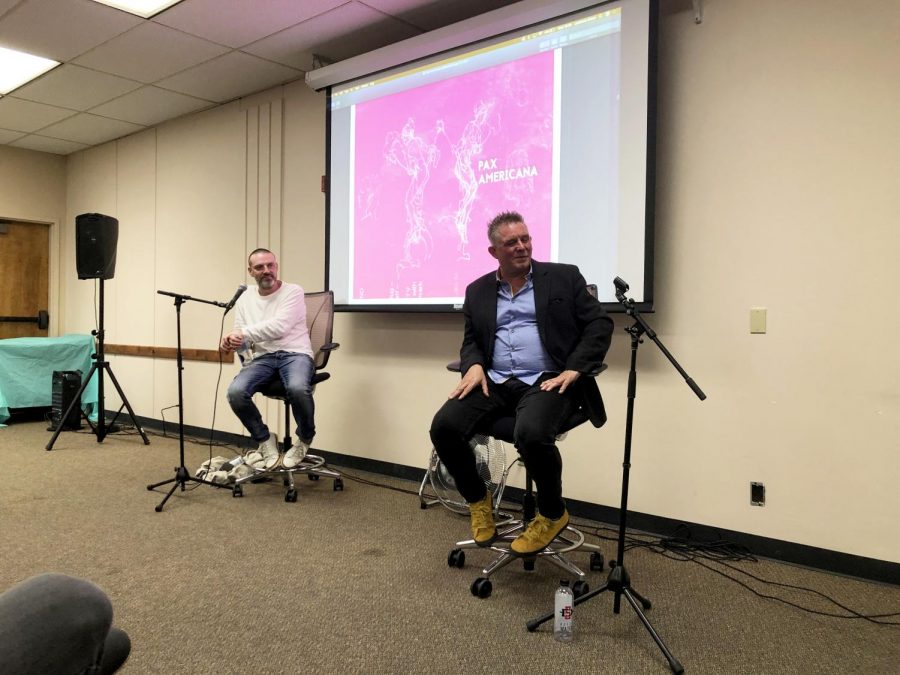Award-winning DC Comics author and illustrator Vincent Deighan, commonly known by his pen-name Frank Quitely, sat down with San Diego State students on Nov. 13 to discuss his work and inquiries concerning the illustration of women and diversity in comics.
The discussion was held in Love Library, where Deighan was accompanied by colleague and acclaimed author, Laurence Grove, who teaches at the University of Glasgow teaching French and text and image Studies. Grove works closely with comics, comic archives and comic exhibitions.
The two comic authors were asked a series of questions led by professor of history Dr. Elizabeth Pollard. Some of the more controversial questions were topics concerning how women are depicted in comics, particularly pertaining to the oversexualization of women in their roles.
“I think comics have been guilty of really exaggerating both male and female physiques to a pretty cheesy extent,” Deighan said. “Female superheroes like male superheroes are always generally going to be idealized.”
Grove touched on the aspect of female roles and their presence in comics. He said women are often characterized or defined by their male counterparts, and they can often be restricted or confined to portraying certain personas and behaviors eluding to the persistence of gender bias.
“In the case of Harley Quinn, is it the notion that evil females can’t be funny?” Grove asked. “(It’s) almost without knowing it, comics (represent) the very basic gender differences that still exist.”
Other questions were centered around the topics pertaining to how comics engage in current issues such as migration, diversity, power and dissent.
“Some comics are doing very well,” Deighan said. “I would say comics are probably better placed to be current because it’s got a real quick turnover in comparison to planning a TV show or making a big budget movie.”
Deighan said there is power behind stories. He presented the story of a group of children during the 1950s who banded together carrying sharpened stakes, kitchen knives and hammers, convinced by an old legend that a vampire had lived among them, based on a story they heard. The local police, teachers and priests managed to talk to the children down, and the story became breaking news the next day.
“So the vampire did not actually exist, but the feat of the vampire and the thought that he existed eventually galvanized 200 of them to go with hammers and knives into the graveyard at night looking for him,” Deighan said. “Then relating this to religion, to politics, to going to war, throughout history the way we’ve used story and the power of story to get people to behave a certain way, or you know to structure society, so it’s pretty fascinating.”
Several professors among the audience expressed their eagerness to expand the use of comics in SDSU’s curriculum, asserting comics’ untapped potential to be used as a teaching tool to teach courses such as history.
Popular culture librarian in Special Collections of University Archives Pamela Jackson said there’s a group of faculty who’ve collaborated to create the comics working group.
The group’s goal is to incorporate better utilization of comics as a resource for teaching and research and to give students more opportunities to work with the wide collection of comics SDSU offers.
“I think the comics medium lends itself to study because it’s so current,” Jackson said. “It’s always brought into current affairs, politics, gender, identity — that’s always been a part of comics in my opinion.”
SDSU has one of the largest comic collections nationwide, Jackson said. In general, San Diego has a close connection to comics given the city is home to Comic-Con, a renowned cultural hub for comics and comic fans alike. The nonprofit convention is dedicated to bringing public recognition and appreciation for comics and related popular art forms.
Computer engineering sophomore Chad Keefer said he was a big fan of Vincent Deighan and was told about the event through a friend.
“I liked their conversation about digital comics,” Keefer said. “It’s obviously becoming a more pivotal part of our world, and seeing both of their takes on comics place in that was really interesting.”
Humanities Senior Angela Graham said she enjoyed listening to both Deighan and Grove’s perspectives on comics. She especially enjoyed Dieghan’s historical anecdote and his emphasis on the power of story.
“When the professors were asking questions about how to use comics to teach history and how just the power of storytelling can influence an entire nation, that was really interesting,” Graham said.
Jackson said the library hopes to host more events in the future to bring awareness to comics on campus.







